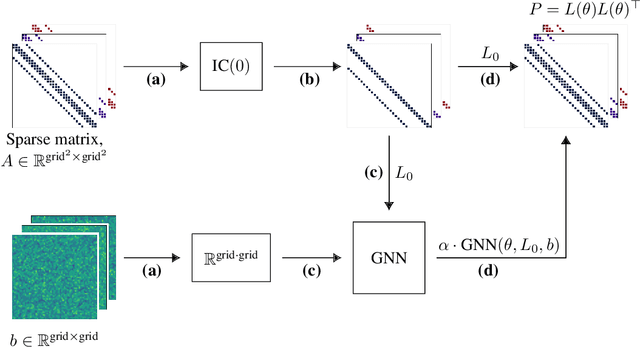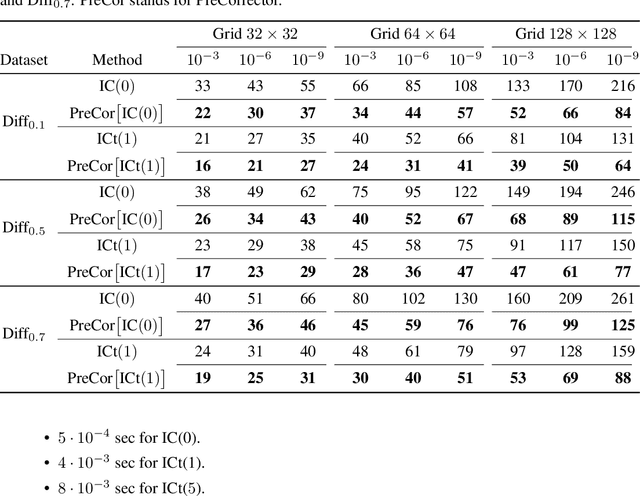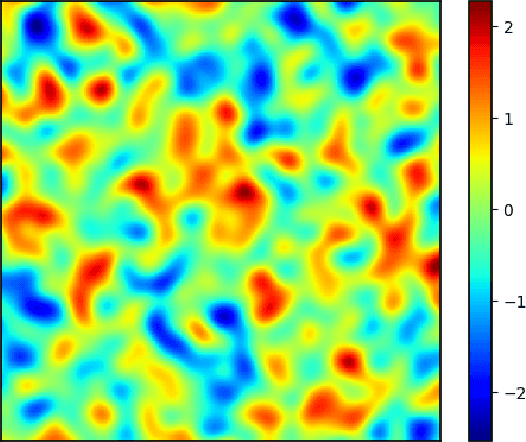Vladislav Trifonov
Geological Field Restoration through the Lens of Image Inpainting
Jun 05, 2025Abstract:We present a new viewpoint on a reconstructing multidimensional geological fields from sparse observations. Drawing inspiration from deterministic image inpainting techniques, we model a partially observed spatial field as a multidimensional tensor and recover missing values by enforcing a global low-rank structure. Our approach combines ideas from tensor completion and geostatistics, providing a robust optimization framework. Experiments on synthetic geological fields demonstrate that used tensor completion method significant improvements in reconstruction accuracy over ordinary kriging for various percent of observed data.
Can message-passing GNN approximate triangular factorizations of sparse matrices?
Feb 03, 2025Abstract:We study fundamental limitations of Graph Neural Networks (GNNs) for learning sparse matrix preconditioners. While recent works have shown promising results using GNNs to predict incomplete factorizations, we demonstrate that the local nature of message passing creates inherent barriers for capturing non-local dependencies required for optimal preconditioning. We introduce a new benchmark dataset of matrices where good sparse preconditioners exist but require non-local computations, constructed using both synthetic examples and real-world matrices. Our experimental results show that current GNN architectures struggle to approximate these preconditioners, suggesting the need for new architectural approaches beyond traditional message passing networks. We provide theoretical analysis and empirical evidence to explain these limitations, with implications for the broader use of GNNs in numerical linear algebra.
ConDiff: A Challenging Dataset for Neural Solvers of Partial Differential Equations
Jun 07, 2024Abstract:We present ConDiff, a novel dataset for scientific machine learning. ConDiff focuses on the diffusion equation with varying coefficients, a fundamental problem in many applications of parametric partial differential equations (PDEs). The main novelty of the proposed dataset is that we consider discontinuous coefficients with high contrast. These coefficient functions are sampled from a selected set of distributions. This class of problems is not only of great academic interest, but is also the basis for describing various environmental and industrial problems. In this way, ConDiff shortens the gap with real-world problems while remaining fully synthetic and easy to use. ConDiff consists of a diverse set of diffusion equations with coefficients covering a wide range of contrast levels and heterogeneity with a measurable complexity metric for clearer comparison between different coefficient functions. We baseline ConDiff on standard deep learning models in the field of scientific machine learning. By providing a large number of problem instances, each with its own coefficient function and right-hand side, we hope to encourage the development of novel physics-based deep learning approaches, such as neural operators and physics-informed neural networks, ultimately driving progress towards more accurate and efficient solutions of complex PDE problems.
Learning from Linear Algebra: A Graph Neural Network Approach to Preconditioner Design for Conjugate Gradient Solvers
May 24, 2024



Abstract:Large linear systems are ubiquitous in modern computational science. The main recipe for solving them is iterative solvers with well-designed preconditioners. Deep learning models may be used to precondition residuals during iteration of such linear solvers as the conjugate gradient (CG) method. Neural network models require an enormous number of parameters to approximate well in this setup. Another approach is to take advantage of small graph neural networks (GNNs) to construct preconditioners of the predefined sparsity pattern. In our work, we recall well-established preconditioners from linear algebra and use them as a starting point for training the GNN. Numerical experiments demonstrate that our approach outperforms both classical methods and neural network-based preconditioning. We also provide a heuristic justification for the loss function used and validate our approach on complex datasets.
 Add to Chrome
Add to Chrome Add to Firefox
Add to Firefox Add to Edge
Add to Edge